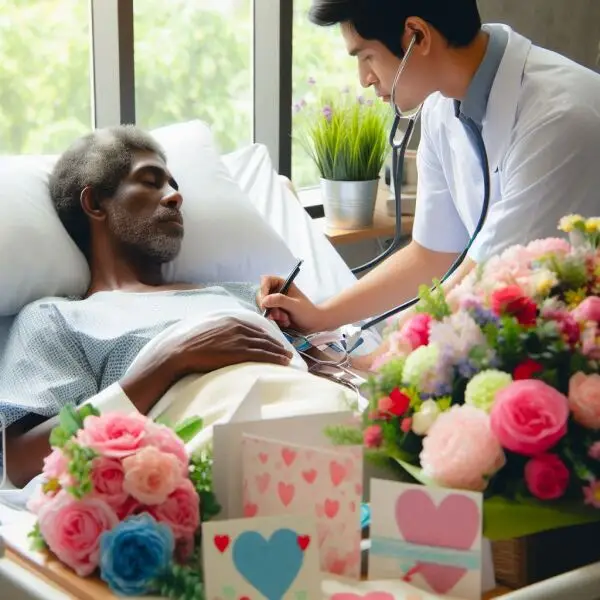Researchers Discover That Comatose Patients Have Awareness
Study reveals that people in a coma maintain awareness, even if they do not respond. Researchers from several countries analyze how this could transform their medical care....
Table of Contents
- The Hidden Awareness: A Breakthrough in the Study of Brain Injuries
- Key Findings of the Study
- Implications for Clinical Care
- The Future of Research in Brain Injuries
Follow Patricia Alegsa on Pinterest!
The Hidden Awareness: A Breakthrough in the Study of Brain Injuries
It is estimated that between 54 and 60 million people suffer traumatic brain injuries each year, which can result in hospitalization or, in the worst cases, death.
Many of these cases lead to permanent disabilities, highlighting the importance of research in this field.
Recently, a study conducted by researchers from the United States, United Kingdom, Canada, China, and other countries has revealed a surprising finding: the existence of "hidden awareness" in patients with brain injuries.
This study, published in The New England Journal of Medicine, opens new possibilities for the care and rehabilitation of these patients.
The study, led by Nicholas Schiff from Cornell University, included 353 adults with disorders of consciousness.
Key Findings of the Study
The study, led by Nicholas Schiff from Cornell University, included 353 adults with disorders of consciousness.
Through functional magnetic resonance imaging and electroencephalograms, it was discovered that approximately one in four patients who showed no observable responses to commands were, in fact, capable of performing cognitive tasks covertly.
This means that these patients, although they may appear unresponsive, can understand instructions and maintain attention.
Researcher Yelena Bodien, the lead author of the study, explains that this phenomenon, termed "cognitive-motor dissociation," shows that cognitive activity can be present even when motor responses are not.
Researcher Yelena Bodien, the lead author of the study, explains that this phenomenon, termed "cognitive-motor dissociation," shows that cognitive activity can be present even when motor responses are not.
This discovery raises important ethical and clinical questions about how to use this invisible cognitive ability to establish communication systems and improve recovery.
The findings of this study have significant implications for the care of patients with brain injuries.
Implications for Clinical Care
The findings of this study have significant implications for the care of patients with brain injuries.
According to Dr. Ricardo Allegri, one of the keys to this work is that it could change the way stimulation and rehabilitation for these patients are scheduled.
Instead of solely relying on responses to commands, healthcare professionals will need to consider cognitive activity that may not be observable.
Patients' families have reported that knowing about the existence of this cognitive-motor dissociation can radically change the way the clinical team interacts with their loved ones.
Patients' families have reported that knowing about the existence of this cognitive-motor dissociation can radically change the way the clinical team interacts with their loved ones.
Care becomes more subtle, and more attention is paid to behaviors that may be voluntarily controlled.
Music heals: how it is used to heal patients who have had strokes
Despite the promising results of the study, there are limitations. The lack of standardization in the tests conducted at various research centers has generated variability in the data.
Music heals: how it is used to heal patients who have had strokes
The Future of Research in Brain Injuries
Despite the promising results of the study, there are limitations. The lack of standardization in the tests conducted at various research centers has generated variability in the data.
To advance in this field, it is crucial to validate the tools used and develop systematic methods to assess non-responsive patients.
The study suggests that cognitive-motor dissociation may be present in up to 25% of patients, or even more, highlighting the need for more thorough evaluation.
The study suggests that cognitive-motor dissociation may be present in up to 25% of patients, or even more, highlighting the need for more thorough evaluation.
As research progresses, it is essential for the medical community to adapt to these new findings to improve the care and rehabilitation of those suffering from brain injuries.
In conclusion, the discovery of "hidden awareness" in patients with brain injuries represents a significant advancement in neurology and clinical care, opening the door to new opportunities for rehabilitation and support for these patients and their families.
In conclusion, the discovery of "hidden awareness" in patients with brain injuries represents a significant advancement in neurology and clinical care, opening the door to new opportunities for rehabilitation and support for these patients and their families.
Subscribe to the free weekly horoscope
Aquarius Aries Cancer Capricorn Gemini Leo Libra Pisces Sagittarius Scorpio Taurus Virgo
-
 The Hawk Tuah girl: who is the viral girl of the moment?
The Hawk Tuah girl: who is the viral girl of the moment?
She went viral because of the response she gave in a video. Memes have been created, caps with the phrase, and even a digital currency that reached a capitalization of 10 million dollars. -
 Magnesium and vitamin C, the perfect nutritional duo
Magnesium and vitamin C, the perfect nutritional duo
Magnesium and vitamin C together? Experts clear up doubts about this popular nutritional duo. Any risks? Find out here. -
 5 Keys to Prevent Cognitive Decline in Middle Age
5 Keys to Prevent Cognitive Decline in Middle Age
Discover five essential keys to prevent cognitive decline in middle age. Ineco shares exclusive tips to reduce risks by up to 45%. -
 Fashion Trends: Maxi Bags, How to Choose Yours
Fashion Trends: Maxi Bags, How to Choose Yours
Maxi bags step out of the backstage and take center stage: which to choose, what to avoid, ideal colors for you. -
 Adult Acne: Causes, Treatments, and Effective Tips
Adult Acne: Causes, Treatments, and Effective Tips
Discover why acne affects adults, the most effective treatments, and expert advice to manage it successfully. Regain confidence in your skin!
I am Patricia Alegsa
I have been writing horoscope and self-help articles professionally for over 20 years.
Subscribe to the free weekly horoscope
Receive weekly in your email the horoscope and our new articles on love, family, work, dreams and more news. We do NOT send spam.
Astral and numerological analysis
-
 Discover your future, secret personality traits and how to improve in love, business and life in general
Discover your future, secret personality traits and how to improve in love, business and life in general
-
 Online Dream Interpreter: with artificial intelligence
Do you want to know what a dream you had means? Discover the power of understanding your dreams with our advanced online dream interpreter using artificial intelligence that responds to you in seconds.
Online Dream Interpreter: with artificial intelligence
Do you want to know what a dream you had means? Discover the power of understanding your dreams with our advanced online dream interpreter using artificial intelligence that responds to you in seconds.
-
 Richard Gere at 75: The 3 Habits That Keep Him Fit and Happy
Richard Gere at 75: The 3 Habits That Keep Him Fit and Happy
At 75, Richard Gere looks incredible thanks to three simple habits: exercise, spirituality, and self-care. His secret: a plant-based diet for decades. -
 Is it true that we should wait to swim after eating?
Is it true that we should wait to swim after eating?
Should we wait 2 hours after eating before swimming? Discover what science says about the famous myth of 'digestion interruption' that intrigues us every summer. ?♀️? -
 Why Does Time Fly as We Age? Discover the Science Behind It
Why Does Time Fly as We Age? Discover the Science Behind It
Discover why years fly by as we age: psychology and neuroscience reveal how metabolism, routine, and experiences influence our perception of time. -
 Olives to the Rescue! Green vs Black: Which Are Better?
Olives to the Rescue! Green vs Black: Which Are Better?
Olives: the Mediterranean superfood. Green or black? Both take care of your heart, strengthen your immune system, and combat inflammation. -
 Ice baths: Miracle recovery for your physical training?
Ice baths: Miracle recovery for your physical training?
Ice baths: miracle for your muscles? Athletes and celebrities love them, but beware; experts warn about risks if not used properly. Attention! -
 Discover the fruit rich in vitamin C that helps you lose weight
Discover the fruit rich in vitamin C that helps you lose weight
Fruit rich in vitamin C and water, ideal for weight loss. Nutritionists recommend it to improve nutrition and strengthen the immune system. -
 10 incredible benefits of quitting alcohol
10 incredible benefits of quitting alcohol
Discover the 10 incredible benefits of quitting alcohol: improve your physical, mental, and social health. Dare to transform your life today! -
 Transform Your Life: Small Daily Habit Changes
Transform Your Life: Small Daily Habit Changes
Discover how to transform your life with simple habit changes. This article is your guide to a fuller and healthier existence. -
 30 Essential Nutrients for Your Health: Practical Guide
30 Essential Nutrients for Your Health: Practical Guide
Discover the essential nutrients for your health, from heartbeats to cell formation, and learn how to incorporate them into your daily diet. -
 How Your Love Life Will Suffer in 2026 According to Your Zodiac Sign
How Your Love Life Will Suffer in 2026 According to Your Zodiac Sign
If your love life is troubled or somewhat complicated, I suggest reading about how things will go for you this year and what changes you could make to improve the situation. -
 What does it mean to dream of firearms?
What does it mean to dream of firearms?
Discover the true meaning behind dreams with guns - is it a warning or a message about your safety? Read our article now! -
 Goodbye, Cramps! Uncover Their Secrets and How to Prevent Them
Goodbye, Cramps! Uncover Their Secrets and How to Prevent Them
Discover why cramps occur and how to prevent them! Learn to avoid these discomforts with tips from sports medicine experts. -
 Do you forget what you learn? Discover strategies to retain knowledge
Do you forget what you learn? Discover strategies to retain knowledge
An analysis reveals that we forget a large part of knowledge in less than 24 hours. Discover effective strategies to improve information retention.